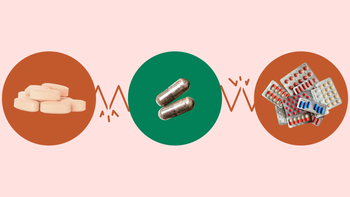
How Long Does it Take Ginkgo Biloba to Work? Plus, 6 More FAQs
Key takeaways:
Ginkgo biloba is a popular over-the-counter OTC) herbal supplement. It has potential antioxidant, heart protective, and anti-inflammatory effects in the body. But ginkgo biloba isn’t FDA approved to treat any health conditions.
It takes about 4 to 6 weeks to see an effect once you start taking ginkgo biloba. And it’s best to take it daily on a long-term basis for best results. Ginkgo biloba has drug interactions to consider and can worsen some health conditions. So be sure to get your healthcare team’s OK before you take it.
Most studies use ginkgo biloba dosages of 80 mg twice a day or 40 mg 3 times a day. It’s best to take it with meals to lessen side effects. Doses over 240 mg daily aren’t recommended. When choosing a ginkgo biloba supplement, look for one that contains the standardized ginkgo biloba extract known as EGb 761.
Table of contents

Ginkgo biloba is one of the most popular over-the-counter (OTC) herbal supplements in the world. It’s made from the dried leaves of the Ginkgo tree. And it’s been a mainstay of traditional Chinese medicine for thousands of years.
Today, many people turn to ginkgo supplements to help manage conditions such as dementia, anxiety, and glaucoma. But what does ginkgo actually do in the body? And how long does it take for ginkgo biloba to work?
Below, we’ll answer these and more commonly asked questions about ginkgo biloba.
Save over 40% on Qsymia with GoodRx
Discover the once daily Qsymia for weight management. Qsymia is for adults and children 12-17 in combination with a healthy diet and regular exercise.

1. How does ginkgo biloba work?
Ginkgo biloba contains three types of active ingredients: terpenoids, flavonoid glycosides, and organic acids. The amount of each compound can vary between individual ginkgo trees. So most studies on ginkgo biloba use a standardized ginkgo biloba extract called EGb 761.
Ginkgo biloba seems to work in several ways:
Through antioxidant effects: Ginkgo biloba helps reduce free radicals in the body. Free radicals are compounds that can damage cells if they build up too much. Antioxidants, such as ginkgo biloba, are compounds that bind to and remove free radicals from the body. Ginkgo’s effect on free radicals seems to be connected to its reported ability to lower cholesterol levels, improve memory, and protect against damage caused by neurodegenerative diseases (such as Alzheimer’s disease).
Through protective effects on the heart: Ginkgo biloba may help prevent unwanted blood clots. It may also help relax and widen blood vessels to help improve blood flow through the body.
Through anti-inflammatory effects: Ginkgo biloba may lower levels of inflammatory proteins in the body. Chronic inflammation is associated with conditions such as heart disease, diabetes, and autoimmune disease. So ginko’s anti-inflammatory effects have the potential to help protect against these types of conditions.
It’s important to note that many studies looking at the benefits of ginkgo biloba were done using animals, not humans. And the studies involving humans often include a very small number of participants. This makes their results unreliable. And many studies on the possible benefits of ginkgo biloba have conflicting results.
2. How long does it take ginkgo biloba to work?
Don’t get discouraged if you don’t see improvements shortly after starting ginkgo biloba. It may take 4 to 6 weeks to notice an effect. And since many of ginkgo’s reported uses are to protect against certain conditions, you may not notice a change at all.
3. Do you need to take ginkgo biloba every day?
Yes. You’ll get the most out of taking ginkgo biloba if you take it daily on a long-term basis. Since most of its effects take place over time, it’s not a supplement that works if you only take it “as needed.”
Read more like this
Explore these related articles, suggested for readers like you.
If you’ve been taking ginkgo biloba (with your healthcare team’s OK) for 6 weeks or more without an effect, consider changing the supplement you’re taking. Since supplements aren’t regulated the same way as prescription medications, there’s a chance the one you’re taking isn’t of good quality. Talk to your pharmacist about a reliable brand to try.
4. When is the best time to take ginkgo biloba?
You can take ginkgo biloba any time of the day. Most studies use ginkgo biloba dosages of 80 mg twice a day or 40 mg 3 times a day. Dividing the daily dose into two or three smaller doses like this can help reduce side effects.
It’s best to pick times that work best for you to take ginkgo biloba every day and try to stick with them. Taking ginkgo biloba with meals can help reduce nausea, a common side effect. It can also make it easier to remember to take it.
5. Can you take ginkgo biloba with other medications?
It depends. Ginkgo biloba can affect how your liver breaks down other medications. This can alter medication levels in your body, which can make it less effective or increase the change of side effects.
Examples of medications that can interact with ginkgo biloba include:
Certain antidepressants, such as monoamine oxidase inhibitors
Warfarin (Coumadin, Jantoven) and other blood thinners
Nifedipine (Procardia)
It’s best to review your current medication list with your medical team (including your pharmacist) before you start taking ginkgo biloba. They can make sure there aren’t any interactions that could be a problem for you.
6. What’s the best form of ginkgo biloba?
Ginkgo biloba comes in many different dosage forms, such as pills, liquids, and even teas. It’s best to choose a form that uses the standardized ginkgo biloba extract known as EGb 761. This should be listed in the active ingredients on the bottle.
Also, look for a dosage form from a reputable brand with a third-party certification, such as a USP-verified symbol. These added certifications help ensure that what’s in the supplement matches what’s on the label. This is particularly important as the FDA doesn’t regulate supplements the same way they regulate prescription and OTC medications.
7. Is ginkgo biloba safe to take?
Ginkgo biloba is generally safe and well-tolerated at doses up to 240 mg per day. Higher doses are more likely to cause side effects and drug interactions. However, lower doses can still cause side effects, such as stomach issues or headaches.
An animal study on ginkgo biloba showed an increased risk of liver and thyroid cancer with long-term use (2 years). But it’s unclear if the same risk applies to humans.
Ginkgo biloba can also cause problems with certain health conditions. It’s best to talk to your healthcare team before taking ginkgo biloba if you:
Take a blood thinner medication
Are living with diabetes
Have a history of seizures
Take medications for depression or other mental-health conditions
Are pregnant or breastfeeding
Good to know: Raw ginkgo biloba seeds (or large amounts of cooked seeds) can be toxic. Consuming them can cause seizures and vomiting. Standardized ginkgo biloba extract shouldn’t contain seeds, but trace amounts have been found in some ginkgo biloba supplements.
The bottom line
Ginkgo biloba is an herbal supplement you can purchase over the counter. It may help with memory, anxiety, and glaucoma, among other health conditions. Ginkgo biloba has antioxidant, heart-protective, and anti-inflammatory effects in the body. The most-studied form of ginkgo biloba is the standardized extract known as EGb 761.
As far as how long it takes for ginkgo biloba to work, allow about 4 to 6 weeks to notice a change once you start taking it. For best results, you’ll need to take it every day on a regular basis. Ginkgo biloba doses of up to 240 mg a day are considered safe. Most studies use 40 mg three times a day or 80 mg twice a day. It’s best to take ginkgo biloba with food to lessen side effects. And choose a product that contains EGb 761 as the active ingredient.
Talk to your healthcare team before starting ginkgo biloba. It has drug interactions to consider and can interfere with certain health conditions. Your care team can make sure it’s a safe supplement for you.
Why trust our experts?



References
Biernacka, P., et al. (2023). The potential of ginkgo biloba as a source of biologically active compounds-A review of the recent literature and patents. Molecules.
Dietary Supplement Label Database. (2023). Ginkgo biloba. National Institutes of Health.
Mei, N., et al. (2017). Review of Ginkgo biloba-induced toxicity, from experimental studies to human case reports. Journal of Environmental Science and Health. Part C, Environmental Carcinogenesis & Ecotoxicology Reviews.
Mousavi, S. N., et al. (2022). Beneficial effects of Ginkgo biloba leaf extract on inflammatory markers: A systematic review and meta-analysis of the clinical trials. Phytotherapy Research.
National Institutes of Health. (2020). Ginkgo.
Nguyen, T., et al. (2023). Ginkgo Biloba. StatPearls.
Rider, C. V., et al. (2014). Toxicity and carcinogenicity studies of Ginkgo biloba extract in rat and mouse: Liver, thyroid, and nose are targets. Toxicologic Pathology.
Rodríguez, M., et al (2007). Reduction of atherosclerotic nanoplaque formation and size by Ginkgo biloba (EGb 761) in cardiovascular high-risk patients. Atherosclerosis.
Silva, H., et al. (2022). Cardiovascular activity of ginkgo biloba-An insight from healthy subjects. Biology.
Tabassum, N. E., et al. (2022). Ginkgo biloba: A treasure of functional phytochemicals with multimedicinal applications. Evidence-based Complementary and Alternative Medicine.
Yoshika, M., et al. (2004). Studies on interactions between functional foods or dietary supplements and medicines. IV. Effects of ginkgo biloba leaf extract on the pharmacokinetics and pharmacodynamics of nifedipine in healthy volunteers. Biological & Pharmaceutical Bulletin.





























